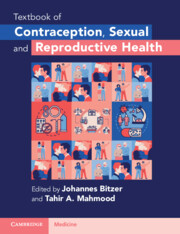Book contents
- Textbook of Contraception, Sexual and Reproductive Health
- Textbook of Contraception, Sexual and Reproductive Health
- Copyright page
- Contents
- About the Authors
- Contributors
- Section 1 Sexual and Reproductive Health and Rights, Public Health Aspects and Prevention in Sexual and Reproductive Healthcare
- Section 2 Sexual and Reproductive Healthcare
- Section 2A Sexual and Reproductive Healthcare: Contraception
- Chapter 9 The Reproductive Endocrinology of Contraception
- Chapter 10 Evidence-Based Clinical Practice in Contraceptive Counselling and Care
- Chapter 11 Combined Hormonal Contraception
- Chapter 12 Progestogen-Only Contraception
- Chapter 13 Nonhormonal Contraception
- Chapter 14 Permanent Methods of Contraception in Women
- Chapter 15 Emergency Contraception
- Chapter 16 Management of Issues Associated with Female Contraceptives
- Chapter 17 Management of Issues Associated with Female Contraceptives
- Chapter 18 Management of Issues Associated with Female Contraceptives
- Chapter 19 Management of Issues Associated with Female Contraceptives
- Chapter 20 Contraception in Women with Cancer
- Chapter 21 Contraception in Women with Benign Breast Disease and Benign Uterine and Ovarian Conditions
- Chapter 22 Contraception in Women with Cardiovascular Conditions
- Chapter 23 Contraception in Women with Metabolic Conditions
- Chapter 24 Contraceptive Choices for Women with HIV Infection
- Chapter 25 Contraception in Women with Neurological Conditions
- Chapter 26 Contraception in Women with Psychiatric Conditions
- Chapter 27 Contraception in Disabled Women
- Chapter 28 Contraception in Women with Immunosuppressive Diseases
- Chapter 29 Contraception in Women with Lupus Autoimmune Diseases
- Chapter 30 Contraception in Women with Chronic Kidney Disease
- Chapter 31 Contraception in Women with Diabetes
- Chapter 32 Contraception in Women with Thyroid Dysfunction
- Chapter 33 Contraception in Women with Polycystic Ovary Syndrome
- Chapter 34 Contraception in Women with Special Needs
- Chapter 35 Male Contraception
- Section 2B Sexual and Reproductive Healthcare: Termination of Pregnancy
- Section 2C Sexual and Reproductive Healthcare: Infertility
- Section 2D Sexually Transmitted Infections
- Section 3 Sexual Healthcare
- Section 4 Sexual and Reproductive Health Indicators and Policies
- Index
- References
Chapter 10 - Evidence-Based Clinical Practice in Contraceptive Counselling and Care
from Section 2A - Sexual and Reproductive Healthcare: Contraception
Published online by Cambridge University Press: 16 January 2024
- Textbook of Contraception, Sexual and Reproductive Health
- Textbook of Contraception, Sexual and Reproductive Health
- Copyright page
- Contents
- About the Authors
- Contributors
- Section 1 Sexual and Reproductive Health and Rights, Public Health Aspects and Prevention in Sexual and Reproductive Healthcare
- Section 2 Sexual and Reproductive Healthcare
- Section 2A Sexual and Reproductive Healthcare: Contraception
- Chapter 9 The Reproductive Endocrinology of Contraception
- Chapter 10 Evidence-Based Clinical Practice in Contraceptive Counselling and Care
- Chapter 11 Combined Hormonal Contraception
- Chapter 12 Progestogen-Only Contraception
- Chapter 13 Nonhormonal Contraception
- Chapter 14 Permanent Methods of Contraception in Women
- Chapter 15 Emergency Contraception
- Chapter 16 Management of Issues Associated with Female Contraceptives
- Chapter 17 Management of Issues Associated with Female Contraceptives
- Chapter 18 Management of Issues Associated with Female Contraceptives
- Chapter 19 Management of Issues Associated with Female Contraceptives
- Chapter 20 Contraception in Women with Cancer
- Chapter 21 Contraception in Women with Benign Breast Disease and Benign Uterine and Ovarian Conditions
- Chapter 22 Contraception in Women with Cardiovascular Conditions
- Chapter 23 Contraception in Women with Metabolic Conditions
- Chapter 24 Contraceptive Choices for Women with HIV Infection
- Chapter 25 Contraception in Women with Neurological Conditions
- Chapter 26 Contraception in Women with Psychiatric Conditions
- Chapter 27 Contraception in Disabled Women
- Chapter 28 Contraception in Women with Immunosuppressive Diseases
- Chapter 29 Contraception in Women with Lupus Autoimmune Diseases
- Chapter 30 Contraception in Women with Chronic Kidney Disease
- Chapter 31 Contraception in Women with Diabetes
- Chapter 32 Contraception in Women with Thyroid Dysfunction
- Chapter 33 Contraception in Women with Polycystic Ovary Syndrome
- Chapter 34 Contraception in Women with Special Needs
- Chapter 35 Male Contraception
- Section 2B Sexual and Reproductive Healthcare: Termination of Pregnancy
- Section 2C Sexual and Reproductive Healthcare: Infertility
- Section 2D Sexually Transmitted Infections
- Section 3 Sexual Healthcare
- Section 4 Sexual and Reproductive Health Indicators and Policies
- Index
- References
Summary
The provision for access to contraceptive counselling and advice is today considered a basic human right. The 1994 United Nations International Conference on Population and Development (ICPD) held in Cairo emphasized ‘the right of men and women to be informed and to have access to safe, effective, affordable and acceptable methods of family planning of their choice’. The guarantee that all individuals, particularly women, have access to available contraceptive information that is of good quality and coercion free opens the path towards gender equality while allowing women to control their life choices and fully participate in their community. The ICPD further reaffirmed that ‘the aim of family-planning programmes must be to enable couples and individuals to decide freely and responsibly the number and spacing of their children and to have the information and means to do so and to ensure informed choices and make available a full range of safe and effective methods’ [1].
- Type
- Chapter
- Information
- Publisher: Cambridge University PressPrint publication year: 2024



